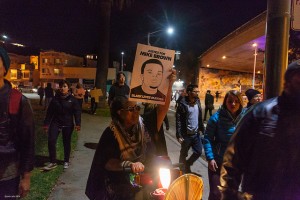In the wake of Ferguson, in the wake of Trayvon Martin and Oscar Grant and the 12-year-old boy with a pellet gun who was recently shot by a police officer in Cleveland and all the other young Black men killed because a White man found  them threatening, it’s hard to know what to say. It’s hard to know what to say to my Black teenage daughter as we take the long way home from downtown Oakland to avoid protests that have started to turn violent. It’s hard to know what to say to Black friends who are grieving publicly on Facebook, who feel assaulted once again by a system which has betrayed them over and over. And it’s hard to know what to say to a good, kind-hearted White friend who feels that her police officer son is being defamed by complaints against the police, and says that we all experience racism, and that we should just all be nice to one another.
them threatening, it’s hard to know what to say. It’s hard to know what to say to my Black teenage daughter as we take the long way home from downtown Oakland to avoid protests that have started to turn violent. It’s hard to know what to say to Black friends who are grieving publicly on Facebook, who feel assaulted once again by a system which has betrayed them over and over. And it’s hard to know what to say to a good, kind-hearted White friend who feels that her police officer son is being defamed by complaints against the police, and says that we all experience racism, and that we should just all be nice to one another.
It’s hard to know what to say, and it’s hard not be impatient with people who seem hopelessly out of touch. I have to start by remembering that we all speak from what we know, what we experience, what we see. We speak as eye-witnesses to our own lives. Which means that for a lot of White people, racism doesn’t really exist, or exists only as a few isolated instances. After all, what most of us who are White see in our daily lives is that the police are there to keep us safe. What we see is that our walking down the street or driving a car is not a subject for police investigation. What we see is that the folks who turn to look at us in stores are wondering if we need help. That’s reality.
And if that’s your reality then rage against the police seems misplaced, unreasonable, unjustified. If the justice system has always looked to you like, well, justice, then protesters on the streets are threats to the public safety, not advocates pushing for public safety. We know what we see. Who we imagine the public to be are the people who look or dress or talk like us.
I suspect that everyone who drives has been in the position of wanting to tell off the idiot who has come to a complete stop in the middle of the street in front of us. Maybe we honk our horn, or just sit there grumbling about the rude, clueless twit blocking our way for no reason—until we finally see the pedestrian crossing past the vehicle that was blocking our view. It turns out that the driver in front of us could see something that we couldn’t, was acting on information that we didn’t have.
Perhaps the first step into conversation about Ferguson, about race, is to find ways to see around the corner, to see the things that aren’t right in front of us. It isn’t easy. The folks with the privilege have every habit of assuming what they see is the “real world,” and every incentive to stay in that comfortable world. The tricky part is that it’s really the job of the White people to help other White people see around the corner. There are many terrific books and blog posts and articles by people of color about their experiences, and White folks would do well to read them. But ultimately it is the responsibility of the White people who’ve caught a glimpse of the pedestrian in the road to help other White people see what is beyond their field of vision. Even when it’s uncomfortable. Even when you don’t quite know how to do it. Even when you’re pointing toward something that’s not altogether clear to you.
Maybe it’s enough to just ask everyone to enter the conversation aware that the fact that you don’t see something doesn’t mean it isn’t there.











